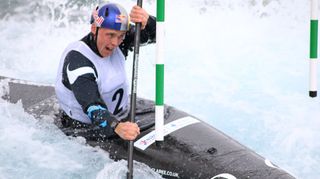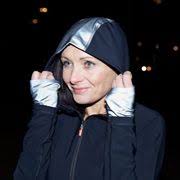Joe Clarke’s Olympic Gold-Medal Winning Training Regime
His victory was 12 years in the making

In This Series
- Olympic Training Tips from the Greats
- Track Cyclist Joanna Rowsell Shand
- Boxer Josh Kelly
- Swimmer James Guy
- Triathlete Gordon Benson
- Rower Helen Glover
- Triple Jumper Nathan Fox
- Slalom Canoeist Joe Clarke
- How To Train Like An Olympian
Congratulations to Team GB’s Joe Clarke, 23, who took Olympic gold in the K1 (kayak single) Slalom Canoeist category – and after just three years on the senior team.
Never a #Gold medal more deserved.Youngest on the #CanoeSlalom #GBR squad. Wins gold! #InspiringTheNextGeneration pic.twitter.com/bxIGQ46U8EAugust 10, 2016
Back in May 2016, he told us how he prepared.
Since the winter of 2012 my training has been focused on Rio, but I’ve dreamed of going to the Olympic Games since 2004, so I guess you could say it’s been 12 years in the making.
My schedule varies but I usually train around 11 times a week with two sessions in the gym and the rest on the water.
My sport is pretty much all upper-body strength, so it’s really important to have a strong core, shoulders, arms and back and make sure they work together in a nice fluid motion. In the gym I do bodyweight exercises, weights and flexibility work to help my movement and core exercises for stability in the kayak.
Gym sessions typically last between 90 minutes and two hours not including a good warm-up and warm-down. I do bench presses, weighted pull-ups, lat pull-downs, biceps curls, front and side planks, leg raises on a chin-up bar, leg tucks, pikes… the list goes on.
I train at Lee Valley, the London 2012 course. On the water we do full runs from the top to the bottom of the course on Wednesday and Friday mornings. The rest of the sessions are technical, focusing on tough moves. The aim of slalom canoeing is to get down the course cleanly. If you touch a gate it’s a two-second penalty, miss one completely and it’s a 50-second penalty. We work on navigating tight sequences of gates, downstream and upstream training and a variety of other sessions. You never know what the course configuration is going to be like in a race so you have to cover all the bases.
Get the Coach Newsletter
Sign up for workout ideas, training advice, reviews of the latest gear and more.
RECOMMENDED: Where to Try Canoeing and Kayaking in London
I’ve been on three training camps in Rio on the Olympic course and I’ve got two more trips there before we head out for the Games. Although we won’t know the configuration of the course until the day, it gives you a good feel for the water and you can start to picture what the Olympics will actually be like, which is really exciting.
We’ll start to taper our training as the Games approach. The number of runs we do in a session and the number of sessions we do will decrease so we’ll feel fresh, powerful and ready to go on the start line.
My diet changes throughout the year. In the winter, sessions are longer and more intense so you can afford to eat roughly what you want, although you still need to eat healthily. I try to get ten portions of fruit and veg a day and 150g of protein. In the summer, as we come into racing season, I start to trim it. The amount of protein I eat stays the same but my general food volume decreases. In canoeing, power to weight ratio is very important – the lighter and stronger I am, the faster the boat will move.
I work closely with a psychologist – I think it’s so underrated in sport. You can see someone who doesn’t look that good in training but can perform on the day, whereas others will flake under the pressure. That comes down to mental strength.
I do a lot of visualisation – what the event is going to be like, what the course is going to feel like and how I’m going to complete it, so I can nip any problems in the bud before they happen. You’ve got to make sure you’re prepared, especially when you’ve got 10,000 people watching you live and you’re surrounded by noise. You’ve got two and a half minutes in the start blocks and it can feel like an hour. You’ve got to focus solely on being the fastest from start to finish.
I love canoeing and I want to help get more people taking part. The summer is the best time to start. In winter when you have to wrap up warm and break the ice to get on the water, the Olympic dream feels very far away, but if you have an action plan you just put up with it. On sunny days – like today – I know I’ve got the best job in the world.
RECOMMENDED: Where to Try Kayaking and Canoeing

Charlotte Thomas is a freelance journalist and health and fitness blogger at Lunges & Lycra.
